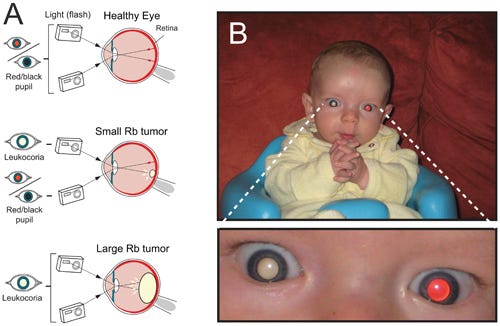November 18, 2013
Sometimes a regular digital camera has the potential to shed light on eye conditions.
In the case of infant Noah Shaw, it may have been an early warning of cancer--and an advance in ophthalmology, according to a recent report in Popular Science.
Noah's father Bryan Shaw, then a post-doctoral chemistry student at Harvard University, wondered how photos of his infant son showed red eye, but only in one eye, the other was milky white.
Several months later, it turned out that Noah had a rare type of eye cancer, known as retinoblastoma.
|
Luckily for Noah Shaw, he only lost an eye from retinoblastoma, and his baby pictures may help save other children's lives in the future. Graphic from PLOS One research article. |
Shaw, now a chemistry professor at Baylor University in Waco TX, joined with other Baylor researchers and Noah's doctors to analyze 7,000 of Noah's baby pictures in order to develop a system for potential early diagnosis of the cancer.
The findings were recently published in PLOS One.
More than 8,000 children are diagnosed with retinoblastoma each, and about half die from the aggressive cancer. Luckily for Noah, he only lost an eye, and his baby pictures may help save other children's lives in the future.
Incidentally, this is not the first time that the digital camera has been harnessed to detect eye conditions including retina-based and other eye problems.
A company known as SkinVision (formerly known as SkinScan) uses a smartphone's built-in digital camera to detect cancerous moles and melanoma. In 2011, the company received EUR50,000 in financing to advance the technology, which uses an algorithm to determine the fractal dimensions of skin lesions and bordering skin tissue. That data is then used to gauge whether the site is potentially cancerous.
At present, however, reviews for the SkinVision product are less than stellar. The Android version of the technology has roughly 1.5 starts out of 5, based on 26 votes at the time of writing.
About the Author(s)
You May Also Like



